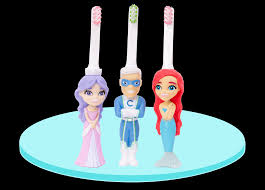Home
Kids
Direct-to-consumer (DTC) kids brands cater to the unique needs of parents and children, offering a diverse range of products and services tailored to this demographic. Brands like Lovevery focus on developmental toys and play essentials, prioritizing child development through thoughtful design. Primary offers high-quality, sustainably-made children's clothing in vibrant colors, simplifying the shopping experience for parents. What sets DTC kids brands apart is their commitment to quality, safety, and convenience. They often bypass traditional retail markups, ensuring affordability for parents while maintaining product excellence. Additionally, DTC brands are known for their innovation, creating novel solutions for modern parenting challenges. In a dynamic market, these brands play a vital role in redefining the shopping experience for families and ensuring that children have access to well-designed, safe, and sustainable products.

Toothbrush Toys creates character-themed toothbrushes and brushing timers that double as fun toys, designed to motivate children to brush their teeth properly. Their products combine engaging storytelling, interactive animations and pediatric-dentist input to transform brushing from a chore into an enjoyable routine. By making oral care exciting, they help kids build healthier habits and support underserved children through charity partnerships.

Toynk offers an extensive selection of toys, games, collectibles, costumes, and movie-branded merchandise, serving fans, families, and hobbyists. They operate a large U.S. warehouse and website to provide a broad range of pop culture items—from action figures and plush toys to cosplay outfits and geek-culture gear. The brand focuses on delivering fan-centric, high-variety product assortments at scale.

Caden Lane provides stylish, comfortable clothing and accessories for newborns and kids, focusing on unique designs and high-quality fabrics. Their collections include everything from pajamas to nursery decor, offering parents trendy and practical options for their little ones.
A successful Direct-to-Consumer (DTC) kids' brand distinguishes itself by not only capturing the attention and imagination of children but also by earning the trust and approval of parents. These brands often blend innovation, quality, and fun to create products and experiences that resonate with families. Here's what contributes to the success of top DTC kids' brands:
Above all, products for kids must be safe and of high quality. Parents look for products that meet or exceed safety standards, are made from non-toxic materials, and are durable enough to withstand the rigors of play. Successful brands are transparent about their safety standards and quality controls, providing reassurance to parents.
Many successful kids' brands incorporate an educational element into their products, whether through toys that encourage STEM skills, books that foster a love of reading, or apps that make learning fun. Products that promote development and learning while entertaining are particularly appealing to parents looking for value beyond mere play.
To captivate children, products need to be engaging, imaginative, and fun. Successful DTC kids' brands often stand out for their creativity, offering unique play experiences, innovative toys, or captivating stories that spark children's imaginations and keep them engaged over time.
Parents and kids alike can become loyal fans of brands that have compelling stories or values. This might include a commitment to sustainability, a focus on inclusivity and diversity, or a mission to support educational initiatives. Brands that stand for something positive can build a strong emotional connection with their audience.
Creating a sense of community can be a powerful strategy for kids' brands. This can include interactive brand experiences, such as events, clubs, or online platforms where kids can share creations or achievements. For parents, forums or social media groups provide valuable spaces for advice and support, deepening the brand's relationship with its audience.
Gaining the trust of parents is crucial for a kids' brand. This involves not only ensuring product safety and quality but also providing excellent customer service, being responsive to feedback, and maintaining an open and ethical business practice. Parental endorsements, whether through word-of-mouth, reviews, or social media, can significantly boost a brand's reputation and success.
The world of kids' products is fast-paced, with trends changing as quickly as children grow. Successful brands stay attuned to these shifts, whether it's the latest in educational approaches, pop culture phenomena, or tech advancements, and adapt their offerings accordingly.
Parents are increasingly looking for products that are not only safe for their children but also for the planet. Sustainable materials, ethical manufacturing practices, and initiatives that give back to the community can make a brand more appealing to environmentally and socially conscious families.
A seamless online shopping experience is vital, with an easy-to-navigate website, detailed product information, and a straightforward checkout process. Since parents often shop online with limited time, the convenience of shopping and the quality of the online experience can be a deciding factor.
Offering subscription services or personalized products can be a successful strategy for kids' brands. Subscriptions ensure a regular engagement with the brand, while personalization makes the products more special and tailored to the child's interests or needs.
Successful DTC kids' brands master the balance between fun and function, creating products that kids love and parents trust. By focusing on safety, educational value, engagement, and building a strong community, these brands can establish a lasting presence in the competitive landscape of children's products.